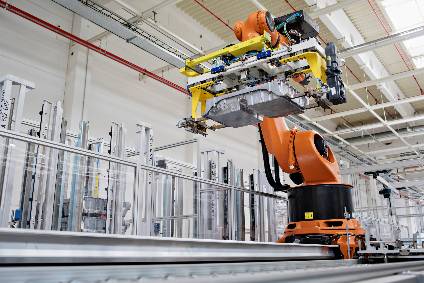
Skoda has manufactured the first production components for Volkswagen Group plug-in hybrid electric vehicles (PHEVs) at its main plant in Mladá Boleslav.
The Czech manufacturer produces high-voltage traction batteries for plug-in hybrids based on Volkswagen Group’s MQB platform.

Discover B2B Marketing That Performs
Combine business intelligence and editorial excellence to reach engaged professionals across 36 leading media platforms.
Michael Oeljeklaus, Skoda Auto Board Member for Production and Logistics, said: “In November 2017, Volkswagen Group decided to task Skoda Auto with the production of electric components for plug-in hybrid cars – a massive expression of trust. In the meantime, we have taken the required measures and rigorously executed the task. The high-voltage batteries, made in Mladá Boleslav, are proof of our outstanding technical expertise and the result of outstanding teamwork from all Skodians involved.”
The high-voltage batteries from Mladá Boleslav provide the electric energy for Volkswagen Group plug-in hybrids that are based on the MQB platform. The battery packs will be used in the Skoda Superb iV (Skoda’s first production model to be fitted with plug in hybrid drive). Production of this model is starting this month at the Kvasiny plant.
Skoda has invested EUR25.3m in the production lines for high-voltage batteries. Two years ago, the brand started preparing the Mladá Boleslav plant for the manufacture of electric components.
Over the next few years, Skoda will increase its initial production capacity of 150,000 units per year.
Christian Bleiel, Head of Component Production at Skoda Auto said: “For us, this production of battery systems, which is very technologically challenging, is an important step in our switch to electromobility. We will further expand the production of electric components. In developing the expertise required for this, we are making use of the exchange of information between experts within our overarching Volkswagen Group Components network. This bundles together knowledge of everything from battery cells to recycling.”
Around 200 staff work, either directly or indirectly, in electric component production. Battery systems are also tested and charged there before being installed in vehicles.
Skoda Auto sources battery cells and modules, the basic components of traction batteries, directly from suppliers. Skoda also said it utilises the global Volkswagen Group network for its manufacturing technology. Working alongside company employees are 13 KUKA robots with load capacities ranging from 210 to 500kg. Most of these machines transport particularly heavy or bulky components. They deliver the battery modules to the assembly line, for example, and load the finished batteries onto transport pallets. Other robots mount the battery modules or cover, which has 39 screws alone, using their screw jack and automatic screw gripper.
When preparing for high-voltage battery production, Skoda said it not only worked on new production technologies but also on other electricity-related topics, including work safety, fire prevention, quality assurance and logistics. Working at the high-voltage assembly line requires specific safety measures and many electronic parts are very sensitive to electrostatic discharge, the company says. Skoda also made alterations to its distribution warehouse so that it can now accommodate a large number of heavy batteries. Furthermore, electricity-specific fire prevention measures and precautions for handling damaged batteries have been implemented, the company says.






